For three years, I’ve been struggling with what feels like a constant battle with sinus infections, so I understand exactly what you’re going through.
The sensation of a heavy, foggy head, bouts of dizziness, and a persistent burning behind the eyes, especially when reading or looking at screens, is all too familiar.
I predict that your nose feels perpetually blocked too, usually on one side, and exposure to strong odors makes it even worse. This condition not only impairs focus but also complicates casual everyday tasks.
Having experienced this firsthand, I know the emotional rollercoaster of frustration and hopelessness it can cause. Sinus infection and brain fog were the worst for me!
However, holistic treatment for sinus infection was my path to healing.
In this article, I’ll share my holistic approach to relieving sinus infections. This comprehensive method not only addresses the symptoms but also promotes overall well-being, which has significantly aided my healing journey.

Image: oumaima.haded
Understanding Sinus Infection
You can’t win a fight if you don’t know your enemy well. Knowledge is your weapon!
A sinus infection is your enemy, and understanding your condition is crucial for effective treatment.
Let’s help you navigate through this and equip you with the knowledge you need to combat sinus infections successfully. (After all, that’s what we do in this blog 😀)
What Happens When You Have a Sinusitis?
The sinus is a hollow space in the skull situated in areas surrounding the nose and eyes.
These cavities maintain optimal respiration by producing mucus which filters and moisturizes the air that you breathe and prevents the intrusion of foreign substances into the body.
The lining of these cavities can undergo inflammation due to bacterial infection, allergy, or exposure to inhalants such as dust, pollen, smoke, animal dander, etc.
Your body responds by swelling the openings to the sinus cavities and producing more mucus.
The whole problem is that swelling blocks the normal flow of mucus.
When the mucus is trapped in the sinus cavity, the infection worsens resulting in sinus infection or what we refer to as ‘sinusitis’.
Sinusitis Is Not a Bad Cold
Understanding the origins and causative factors of sinus infection is crucial because its symptoms may overlap with other conditions such as migraine.
Accurate diagnosis ensures appropriate treatments that target the infected areas.
Sinus pain relief medications, for example, might help alleviate the condition, but won’t effectively address the underlying sinus inflammation causing sinusitis symptoms.
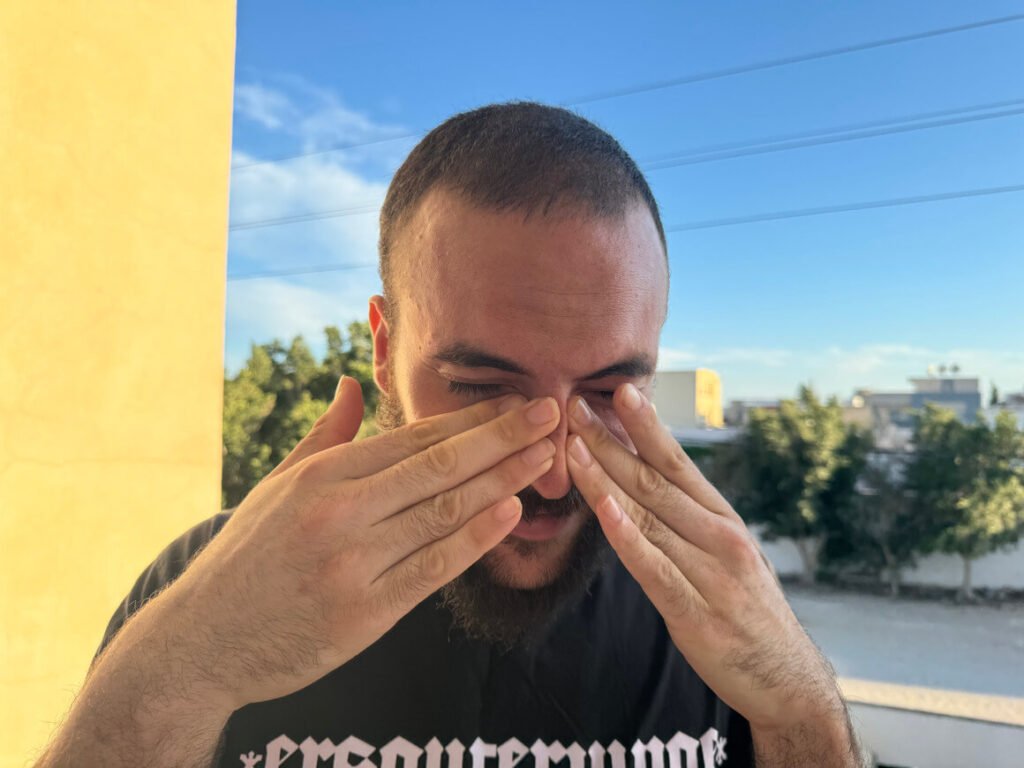
Image: oumaima.haded
Sinus Infection Symptoms
Sinus infection symptoms include:
- Facial pain: headache, pressure behind the eyes, pain in the tooth
- Facial swelling: sensitivity and heaviness around the eyes or on the top of the nose.
- Congestion: nose locked (particularly from one side)
- Thick nasal discharge: Noticeable change in the consistency of nasal discharge that is yellow or greenish and can cause discomfort or congestion in the nasal passages.
- Reduced sense of smell: congestion and blockage in the nasal passages can affect the ability of odor molecules to reach the olfactory receptors leading to diminishing our sense of smell.
These symptoms generally persist beyond the typical duration of a common cold.
In terms of symptoms, each patient can experience sinusitis slightly differently depending on their specific situation and medical condition.
Why You Should Consider Home Remedies for Your Sinus Infection
Seeking natural remedies promotes holistic healing and nurtures the body’s natural immune response.
Throughout my healing journey from sinus infection, I’ve thoroughly researched and tested numerous natural remedies, finding them to be highly effective. Here’s why you should consider home remedies.
Supporting the body’s Natural Immune Response
Rather than alleviating symptoms, natural remedies focus on addressing the root causes of the condition.
Using specific herbs known for their antibacterial or anti-inflammatory properties or incorporating nutrient-dense food into your diet helps the body activate innate healing mechanisms and boost the immune system’s response.
Minimize Potential Side Effects of Medications
Prescription and over-the-counter medications may come with potential side effects like dizziness, nausea, sleep disturbances, nervousness, palpitation, or allergic reactions.
Curting sinus infections at home involves using safe substances derived from plants, herbs, or essential oils known to promote sinus health.
Through extensive testing and observing my body’s responses, I’ve identified effective remedies.
You can personalize your approach by choosing remedies that suit your needs, potentially reducing the risks often associated with standardized medication regimens.
Reduce Dependency on Medications
Long-term reliance on specific medications for sinus infection can sometimes contribute to antibiotic resistance.
Bacteria become less responsive to the drugs used to treat them or medication dependence where the body becomes reliant on the drug to manage symptoms.
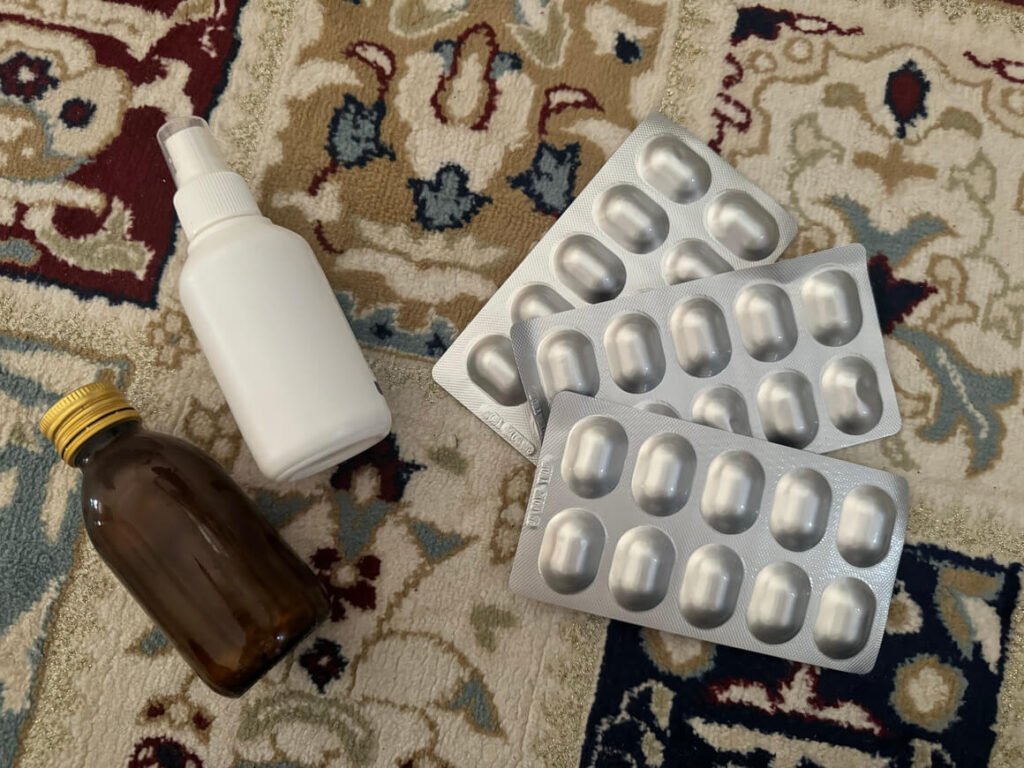
Image: oumaima.haded
Initially, nasal decongestant sprays provided me with significant relief at the onset of my infection.
However, I soon became dependent on them, experiencing rebound congestion as a result of overuse.
You can totally get rid of sinus infection without antibiotics. Natural remedies can offer a safe and sustainable approach that focuses on addressing the root causes of the problem and supporting the body’s innate healing processes.
Holistic Approach to Healing
A holistic treatment for sinus infection perceives the condition from different angles, taking into consideration the interconnectedness of the body, mind, and environment.
Instead of solely focusing on symptom management, it seeks to understand and address the causes of sinus infection while promoting overall health and well-being.
That was exactly my approach to healing. I’ve wanted to play a proactive role in improving my health and embrace safer and more sustainable strategies.
Nature is always key, so here are some of my favorite holistic treatment methods for sinus infections.
Holistic Treatment Methods for Sinus Infections
Avoid Allergens
Sinus infection can be caused by allergens that trigger an allergic reaction and lead to inflammation and congestion in the sinuses.
Allergens include pollen, smoke, dust mites, pet dander, or mold spores,
The inflammation can block the sinus cavities, preventing proper drainage and creating an environment conducive to bacterial growth which can result in sinus infection.
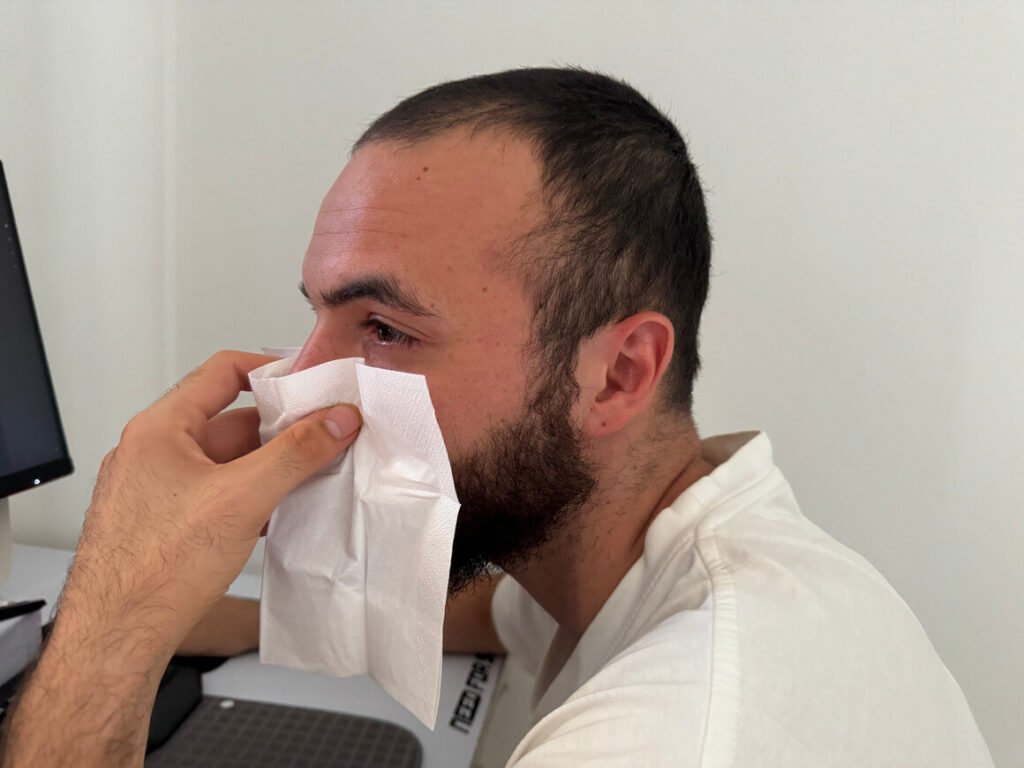
Image: oumaima.haded
You can minimize exposure to allergens by filtering indoor air or keeping windows locked, maintaining optimal humidity levels, and using allergen-proof bedding or pet care.
Basically, your first step to sinus relief is to protect yourself from allergens.
Breath in The Steam
Warm steam helps to soothe and moisturize the nasal passages and promote mucus drainage making it easier to excel and relieve the pressure and discomfort associated with sinusitis.
Now, here’s how it works:
- Fill a bowl with hot water and lean over it
- Cover your head with a towel to create a tent-like enclosure.
- Be careful not to start out too close to the hot water and keep your eyes closed.
Inhale deeply, allowing the steam to penetrate your nasal passages.
You can add a few drops of essential oils for sinus infection, like eucalyptus oil – which contain cineole – an ingredient that stimulates respiratory relief.
Hydration Keeps Your Sinus Moist
According to Del Signore, “Everyone is guilty of not drinking enough water”.
This is particularly important for sinusitis sufferers. Hydration helps to thin mucus in the nasal passage, making it easier for them to drain and reducing the likelihood of blockages.
The Institute of Medicine of the National Academies recommends drinking 2.7 liters (91 ounces or 11 cups) for adult women a day, and 3.7 liters (125 ounces or 15 cups) for men.
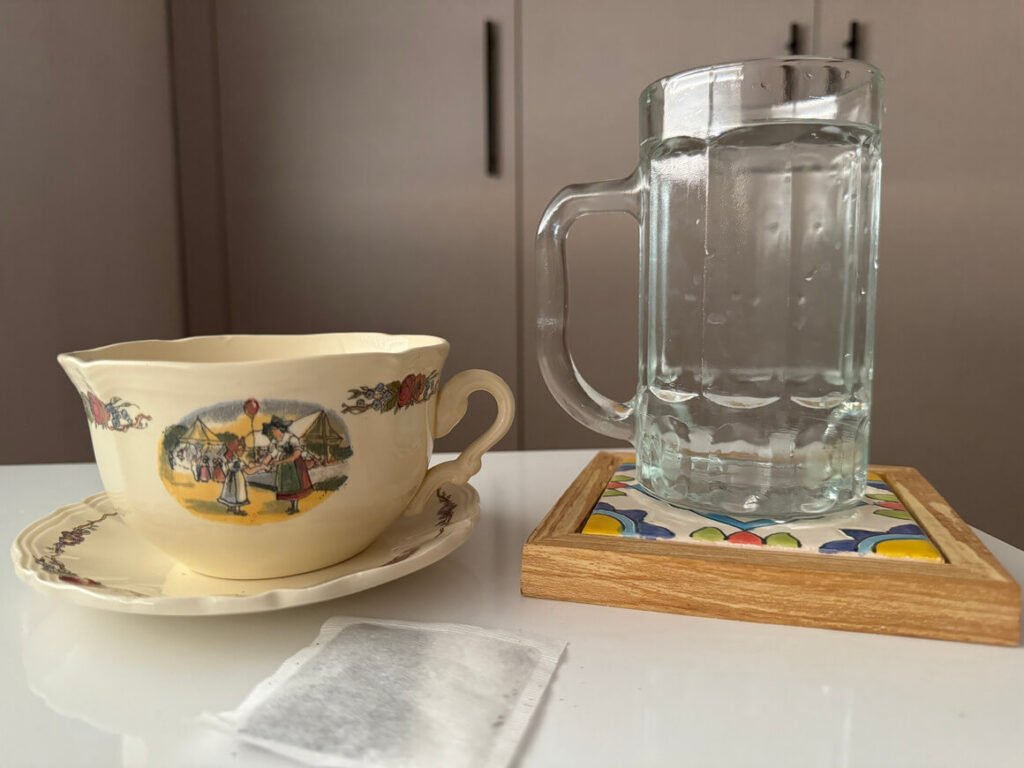
Image: oumaima.haded
Nasal Irrigation With Saline Solution
What Is Nasal Irrigation?
Nasal irrigation, also known as nasal rinsing or nasal lavage, is a method used to flush out the nasal passages with a saline solution.
It involves pouring or spraying a saline solution into one nostril and allowing it to flow out through the other nostril, effectively clearing the nasal passages of mucus, allergens, and irritants.
How to Make a Saline Rinse?
First, make the saline sinus rinse recipe as recommended by the American Academy of Allergy, Asthma & Immunology.
- In a container, mix 3 teaspoons of iodide-free salt with 1 teaspoon of baking soda and store in a small airtight container.
- Add 1 teaspoon of the mixture to 8 ounces (1 cup) of lukewarm distilled or boiled water.
(Use less dry ingredients to make a weaker solution if burning or stinging is experienced. For children, use a half-teaspoon with 4 ounces of water.)
How to Use Saline Rinse?
- Fill the device with the saline solution
- Lean your head downward over a sink or in the shower and tilt it to the left
- Carefully squeeze about 4 ounces of the saline solution into your right nostril
- Keep breathing normally from your mouth
- Allow a few seconds for the solution to flow out through your left nostril.
- Adjust your head position to prevent the solution from reaching your throat or ears.
- Blow your nose gently to prevent water from running into your ear causing discomfort
It is important to follow proper guidelines when performing nasal irrigation to ensure safety and effectiveness.
This includes using sterile water or properly boiled and cooled water to avoid the risk of infection.
It is also crucial to maintain cleanliness and hygiene by thoroughly cleaning and drying the irrigation device after each use.
It is however possible that water doesn’t come out of the other nostril. This can happen if your sinuses are swollen or if your head is not tilted properly.
Keep your head upright for seconds and try blowing your nose.
To prevent that from happening, avoid sinus rinse if you have an ear infection, pressure in one or both ears, if you have a completely blocked nostril, or if you have had surgery on your ears or sinuses.
Spice Up Your Diet
Spicy food is a natural way to open nasal passages and help mucus drainage.
Try hot pepper and you’ll feel genuinely better and your sinuses clearer. It’s the capsaicin effect.
A chemical irritant that produces a burning sensation in any tissue with which it comes into contact.
In the case of sinusitis, capsaicin affects mucous membranes which cause a runny nose, and watery eyes that will help release blocked mucus.
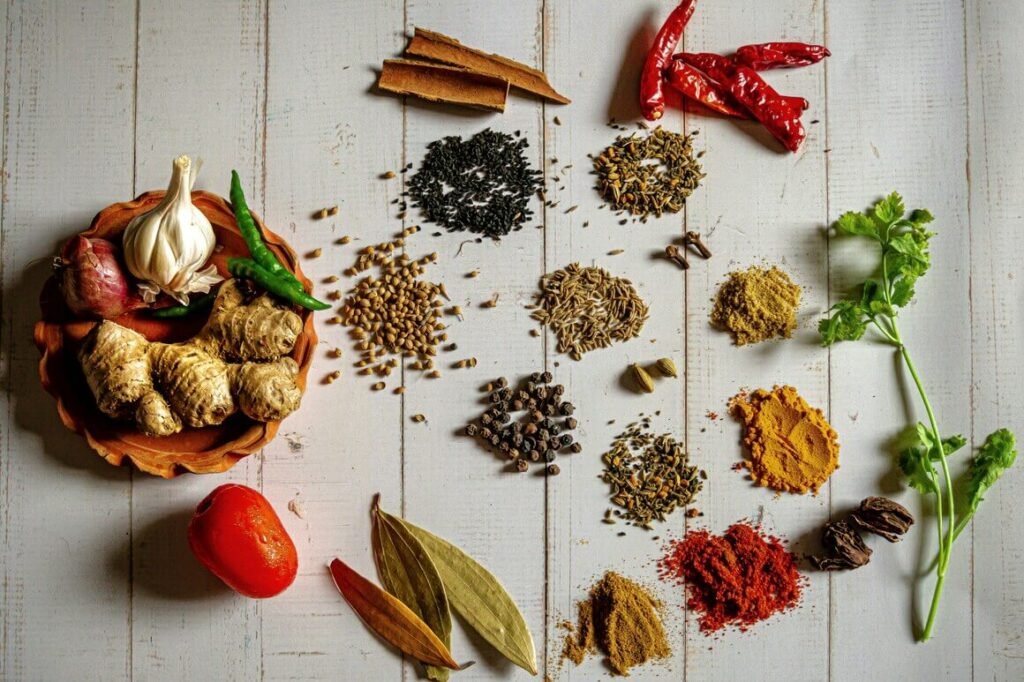
Exercise Promotes Mucus Drainage and Helps Release Endorphins
Generally, light exercise can help with sinus infections. It supports white blood cell production, increases blood circulation, and helps release endorphins. They’re chemicals (hormones) produced in the brain that block the perception of pain and increase feelings of well-being.
As part of a holistic treatment plan, incorporating regular exercise can play a crucial role in alleviating the stress associated with the emotional ups and downs of managing a sinus infection.
Exercise not only promotes physical well-being but also enhances mental clarity and emotional resilience, making it an essential component of holistic care for sinus health.
Which Type of Exercise Is for Sinus Infection?
If you have sinusitis, it is recommended that you avoid weight lifting or running because it requires active respiration.
Sinus infection can cause dizziness and make you lose coordination and balance.
Instead, try riding a bike or taking a brisk walk. These light exercises can help flush out excess mucus and debris, allowing for better drainage and alleviating congestion.
Be very careful with your body’s response, if you find that exercise makes your symptoms worse, you may want to adjust your routine and if necessary stop exercising until your sinus gets better.
Teas for Sinus Infection
Don’t underestimate the power of tea for sinus infections. Incorporating different herbal blends into my routine was a major step in my journey to healing.

Image: oumaima.haded
Nettle Tea
Nettle tea is one of the best solutions that I’ve incorporated into my holistic treatment plan.
It consists of nettle leaves infused in hot water. Along with helping you hydrate and steam out your sinuses as you sip, nettle tea is considered a natural antihistamine that can help counteract the effects of histamine release in the body.
Histamine is a chemical your immune system releases that triggers allergy symptoms. By blocking histamine receptors, nettle tea can help reduce sinus allergies.
It also contains bioactive compounds that have anti-inflammatory effects that can help reduce swelling.
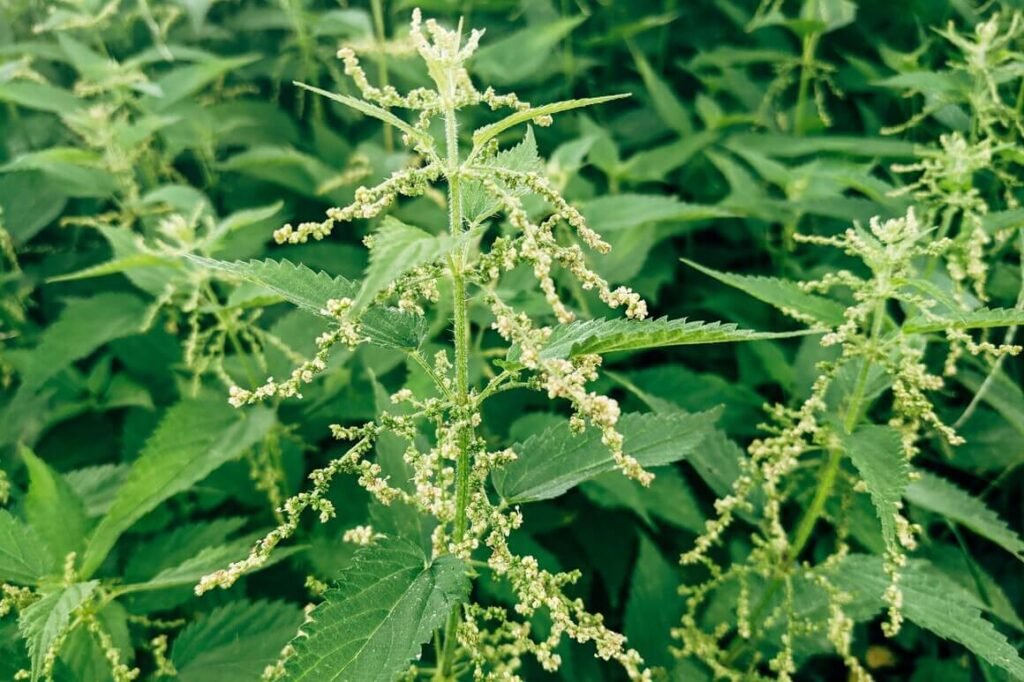
Ginger Tea
Ginger tea is also widely considered a natural antihistamine and inflammatory gingerol which reduces inflammation in your nasal mucosa.
A popular Indian-origin tea made with ginger, lemon, and honey is believed to effectively relieve nasal congestion.
Pro tip: Always place your nose above the cup of tea to allow the steam to effectively relax and decongest your membranes.
Conclusion
Embracing holistic treatment for sinus infections offers a safe and sustainable path to healing, leading to a complete lifestyle makeover. Take proactive steps, one at a time, to achieve lasting wellness!
You should know that, in terms of symptoms, each patient can experience sinusitis slightly differently depending on their specific situation and medical condition.
So make your research profound to understand your allergy roots and deep causes and then, work on improving symptoms naturally.

Image: oumaima.haded
- Relieving Sinus Pressure: My Journey with Chamomile Tea
- How I Used Tea Tree Oil For My Sinus Infection
- How I Treated My Sinusitis with Oregano Oil: Everything You Should Know
- My Healing Journey from Sinusitis | What I did to Transform My Life
- Can Stress Cause a Sinus Infection?
Disclaimer – Knowlege Is Power: This content provides generic information only. It is in no way a substitute for a qualified medical opinion. Always consult a specialist or your own doctor for more information. We do not claim responsibility for this information.
